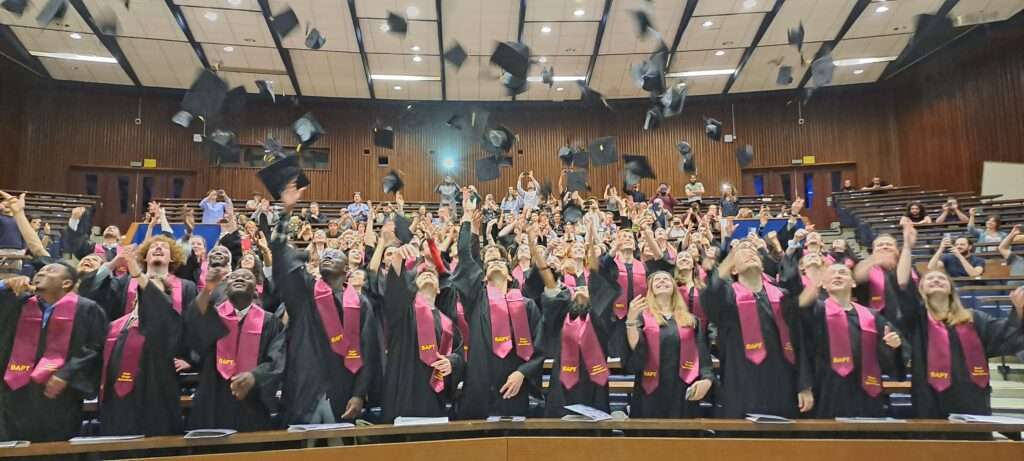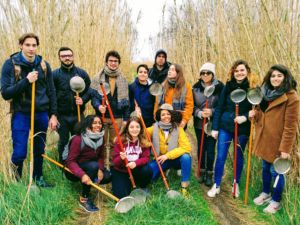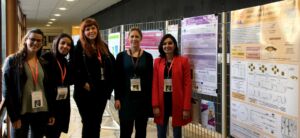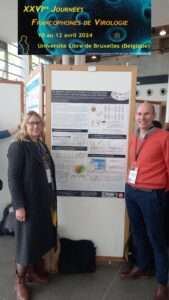Microorganism-Host-Environment Interactions (MHEI)
The IMHE program is unique in the region, offering students training through research in general and environmental microbiology, both fundamental and applied.
The IMHE master's degree aims to provide in-depth knowledge of microbial systems, covering the study of microorganisms as cells, populations and communities in their environment, as well as interactions with their hosts (humans, animals, plants) and vectors. The course covers interactions at the molecular, cellular and microbial community levels, as well as the effect of biotic and abiotic factors on these interactions. It explores the role of microorganisms in the functioning of natural and anthropized ecosystems. The practical and finalized aspects of microbiology are also covered, in particular the applications of microbial biomass and diversity in the fields of agriculture, the environment, health and biotechnology.
Combinations of Teaching UnitsTU) enable us to offer two profiles, one focused on "Fundamental Research" (profile 1), the second on "Research & Development" (profile 2). The program offers students the opportunity to meet a wide range of career goals, with a high placement rate for PhD students (40-50%), and job opportunities in companies or laboratories directly after graduation. Profile 2 students can earn a double diploma by taking additional TU offered by IAE Montpellier (subject to dossier selection). The program is open to apprentices.
The program is based on the region's strong research community in the field of microbiology, and relies on the close involvement of researchers, teacher-researchers and industrialists from this community, both in Montpellier and more widely in the Occitanie region.
The IMHE Master's degree is part of the range of training courses that follow on from the Bachelor's degree in Life Sciences, with a specialization in Microbiology, offered by the University of Montpellier (Faculty of Science). It is open to all students with a Bachelor's degree in Biology or Life Sciences, specializing in Microbiology. It is also part of a microbiology specialization program for students in medicine, pharmacy and dentistry, and for engineering students in biology and agronomy schools (such as Institut Agro).
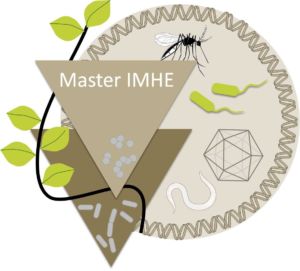 Master IMHE keywords : microorganisms, microbiology, environmental microbiology, microbial ecology, microbiota, emergence, resistance, adaptation, symbiosis, parasitism, genomics, metagenomics, microbial valorization, bacteria, archaea, viruses, fungi, microalgae, eukaryotic microorganisms.
Master IMHE keywords : microorganisms, microbiology, environmental microbiology, microbial ecology, microbiota, emergence, resistance, adaptation, symbiosis, parasitism, genomics, metagenomics, microbial valorization, bacteria, archaea, viruses, fungi, microalgae, eukaryotic microorganisms.
Detailed presentation of IMHE training
Objectives, organization, list of TU, partners, insertion..., it's here
IMHE Master's students produce original scientific results!
The work of IMHE students, in collaboration with students from the Bioinformatics master's program, supervised by their respective teaching supervisors and Jean-Christophe Avarre (ISEM-IRD researcher) as part of the BILLproject, resulted in the publication of an article in an international peer-reviewed journal: link to the article Klafack, S., Fiston-Lavier, A.-S., Bergmann, S.M., Hammoumi, S., Schröder, L., Fuchs, W., Lusiastuti, A., Lee, P.-Y., Heredia, S.V., Master student consortium, Gosselin-Grenet, A.-S., Avarre, J.-C. (2019). Cyprinid Herpesvirus 3 Evolves in vitro through an Assemblage of Haplotypes that Alternatively become Dominant or Under-Represented. Viruses 11, 754.
Other IMHE student publication on The Conversation: link to the article Etudiants Master 1 IMHE (promo 2020), Gosselin-Grenet, A.-S., Avarre, J.-C. (2020). The species leap: when an animal virus generates the emergence of a human disease. The Conversation, published November 4, 2020.
The latest publication by IMHE students: link to the article Etudiants Master 2 IMHE (promo 2022), Teyssier C., Carré-Mlouka A. (2022). Learning through research at the University of Montpellier: Study of soil microbial biodiversity in the Lunaret nature reserve. Étude et Gestion des Sols. Vol. 29. Pages 185-197.
Students present their results at conferences (JFV, JOBIM, Montpellier Omics Days, MicrobiOccitanie 2019, Microbes 2022, JFV 2024) and regularly take part in science outreach activities (Fête de la Science 2020 and 2021; video creation).
Master 1 IMHE
Next back-to-school meeting in early September 2025.
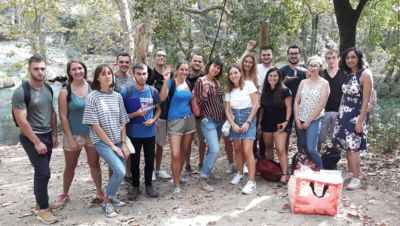
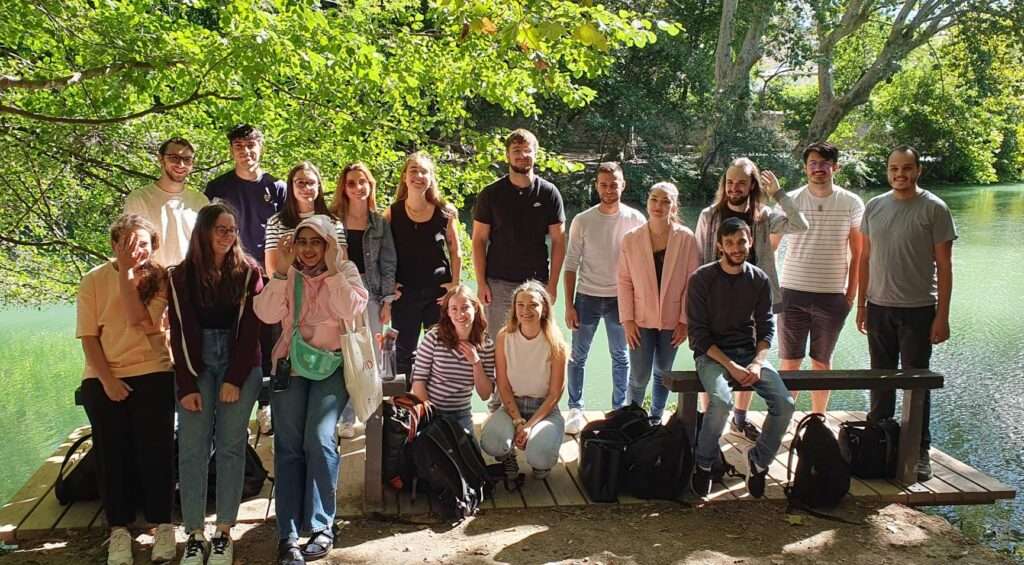
The first year of the M1 program forms the basis of the training, with the acquisition of fundamentals in general microbiology and microbial ecology, and includes practical work and a field trip. The elective TU enable students to follow one of the two profiles, without this choice being definitive (it is possible to change profile each semester without affecting results).
The emphasis is on project-based teaching andpedagogical innovation. Thanks to the sharing of skills with the Faculty of Science's Bioinformatics master's program, and the establishment of the Bioinformatics Learning Lab (BILL), an innovative interdisciplinary learning laboratory, students are encouraged to take an active role in their training, managing a mini research project from A to Z (from field sampling to DNA extraction, sequencing and microbial sequence analysis, in M1) and valorizing their results (publication, conference presentation, in M2). More info on BILL and photos here.
TP BILL (2021 and 2022)
Training through research is also provided through a long internship in a laboratory or company (4 months), culminating in the writing of a thesis and an oral presentation before a panel of specialists.
Field trip to Perpignan (M1 2019)
Master 2 IMHE
The second year of the M2 program builds on the fundamental and applied knowledge and skills acquired in the first year. Students interact with a large number of researchers who come to present their research work, focusing on themes such as the molecular mechanisms of interactions between microorganisms and hosts (with a wide range of models), the role of microorganisms in ecosystems or their valorization.
M2 focuses on the acquisition of a scientific research approach. Students work on bibliographic resources (research, comprehension, criticism and bibliographic synthesis) and pedagogical communication methods, and complete a long internship (6 months) with a scientific report and oral presentation.
During the course, several TU are dedicated to professional integration, during which students work on their professional and personal projects.
IMHE students present their results at conferences (MicrobiOccitanie 2019; JFV 2024)
At the end of M2, students can take the competitive entrance exam to doctoral schools, in particular theDS GAIA, or enter the workforce directly in a public research laboratory or in the R&D sector of a company; these choices are made possible thanks to the choice of profile in M1/M2.
m1 course content - semester 1
COMMON TRACK for Profiles 1 and 2:
- Microbial ecology (HAA712V - 6 ECTS)
- Emergences Resistances Adaptations (HAA714V - 3 ECTS)
- Immunity and genetics of microorganism-host interactions (HAA717V - 2 ECTS)
- Scientific English (HAA703L - 5 ECTS)
- Biostatistics with R (HAA708V - 5 ECTS)
Profile 1 (Basic research)
+ Choice of 'specific profile' grouping = 1 TU from :
- Molecular basis of infectious diseases (HAV714V - 6 ECTS)
- Symbiotic and parasitic interactions (HAB705B - 6 ECTS)
+ Choice of grouping = 1 TU from :
- Phylogeny and evolution (HAB708B - 3 ECTS)
- Elements of plant pathology (HAA713V - 3 ECTS)
Profile 2 (R&D)
+ TU mandatory 'specific profile
- Food and environmental microbiology and toxicology (HAA730V - 3 ECTS)
+ Choice of grouping = 1 TU from :
- Phylogeny and evolution (HAB708B - 3 ECTS)
- Elements of plant pathology (HAA713V - 3 ECTS)
m1 course content - semester 2
COMMON TRACK for Profiles 1 and 2:
- Molecular microbial ecology 1 (HAA803V - 3 ECTS)
- BILL project: HAA804V (2 ECTS) + HAU802I (2 ECTS)
- Internship preparation and professional integration (HAA707V - 2 ECTS)
- 4-month long internship (HAA818V - 18 ECTS)
Profile 1 (basic research)
1 TU 'specific profile' :
- MicrobiEAU (HAA808V - 3 ECTS)
Profile 2 (R&D)
Choice of grouping: 1 TU from among
- Project management (HAA807V - 3 ECTS)
- Bioenergies (HAN802C - 3 ECTS)
- MicrobiEAU (HAA808V - 3 ECTS)
- Pollution in agro-environmental systems (HAA806V - 3 ECTS)
m2 course content - semester 1
COMMON TRACK for Profiles 1 and 2:
- Critical analysis and synthesis of scientific articles (HAA902V - 6 ECTS)
- Interactions of microorganisms with their hosts (HAA923V - 6 ECTS)
- Roles of microorganisms in ecosystem functioning 1 and 2 (HAA938V - 3 ECTS / HAA939V - 3 ECTS)
- Bibliographical summary of internship (HAA934V - 3 ECTS)
- Scientific English (HAA904L - 3 ECTS)
Profile 1 (Basic research)
+ Choice of grouping = 6 ECTS from :
- Virology (HAA935V - 3 ECTS)
- Molecular and Cellular Bacteriology (HAV913V - 6 ECTS)
- Interactions and signaling (HAA924V - 3 ECTS)
- Thematic School (HAA913V - 3 ECTS)
- In-depth phylogeny (HAB946B - 3 ECTS)
- Bioproduction and valorization of microbial biodiversity (HAA910V - 3 ECTS)
Profile 2 (R&D)
+ Choice of grouping = 2 TU from :
- Virology (HAA935V - 3 ECTS)
- Project management (HAA920V - 3 ECTS)
- Bioproduction and valorization of microbial biodiversity (HAA910V - 3 ECTS)
m2 course content - semester 2
Profile 1 (Basic research)
- M2 laboratory internship (HAA011V - 27 ECTS)
- Professional networks and projects (HAA006V - 3 ECTS)
Profile 2 (R&D)
- Setting up R&D projects (HAA004V - 5 ECTS)
- M2 internship (HAA010V - 25 ECTS)
Graduation 2023
